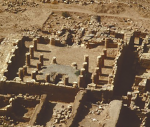You are here
Experts give local perspective on preventing, combating violent extremism
By JT - Apr 26,2018 - Last updated at Apr 26,2018
AMMAN — The West Asia-North Africa (WANA) Institute and Friends of Europe on Thursday gathered 15 national experts and policymakers to discuss how to localise Preventing/Countering Violent Extremism (P/CVE) efforts, a statement by WANA said.
Participants took part in a debate on how to implement community-driven P/CVE projects and design counter-narratives that suit the Jordanian context.
"Despite the importance of community-driven P/CVE projects, many stakeholdersin Jordan face challenges securing financial support or obtaining the necessary security clearances," Ma’an Al Momani from the Ministry of Education said, stressing the importance of empowering teachers to implement successful P/CVE projects at the local level.
“The ministry is working on various projects that contribute to countering violent extremism through the school curricula. We also train the teachers in cooperation with the Queen Rania Teacher Academy, so they can transfer their knowledge to the students,” he continued.
President of Generations for Peace Mohanned Arabiat argued for the need to increase trust in local organisations, saying “We need to build trust between the local community and the public and private sectors and to empower local government workers and employees at community-based organisations. Investing in local leadership, especially youth leadership, is essential so that local communities can find their own solutions to the problems they face.”
“In addition to focusing on decentralisation, the central government should operate more transparently; if there is a lack of trust, local communities will be reluctant to cooperate,” Mohammad Nasereddin from Mercy Corps pointed out in the statement.
Patrick Daru from the ILO reminded the participants that “while the struggle against violent extremism is indeed fought on the local level, we simultaneously need strong national structures for improved social dialogue in the country”.
For Barik Mhadeen from the WANA Institute, a crucial aspect of P/CVE work is countering the ideology and narratives of violent extremist groups. He stressed: “We need to move from designing mere counter-narratives that negate what violent extremist groups say, to designing positive alternative narratives that provide the audience with an alternative worldview."
The participants also stressed the need to focus on narratives at the community level, the statement read. “We need to focus on how the alternative narrative is conveyed,” researcher Leen Aghabi mentioned, adding “since mothers often detect early signs of radicalisation, we need to provide training to help them understand what good alternative narratives are. Female preachers, NGOs and civil society organisations have a big role to play here.”
To decrease youth’s vulnerability to radical narratives and ideology, Morad Al Qadi from the Strong Cities Network noted that youth need to be given the space to develop their own identities independently: “Many Jordanian youth struggle with their religious and community identities as well as with defining their future aspirations, which makes them more vulnerable to radical ideology,” Al-Qadi stated.
The event was organised as part of the local launch of the Friends of Europe’s fifth global online security brainstorm report "Debating Security Plus (DS+)", held last September with the participation of 1,700 people from 122 countries, the statement concluded.
Related Articles
AMMAN — Women can be an invaluable source of community information, and play a role in countering violent extremism in society, a recent stu
AMMAN — The Strong Cities Network (SCN) is delivering a regional preventing and countering violent extremism (P/CVE) programme to further in
AMMAN — The West Asia North Africa (WANA) Institute, under the umbrella of the “Strong Cities Network in Lebanon and Jordan”, is condu
















